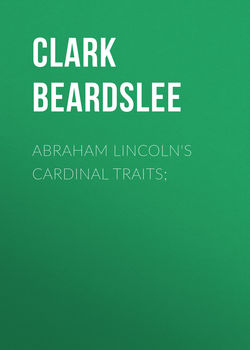Abraham Lincoln's Cardinal Traits;

Реклама. ООО «ЛитРес», ИНН: 7719571260.
Оглавление
Beardslee Clark Smith. Abraham Lincoln's Cardinal Traits;
PREFACE
PART I. INTRODUCTION
Lincoln's Mental Energy
Lincoln's Moral Earnestness
PART II. ANALYSIS
His Reverence for Law – Conscience
His Jealousy for Liberty – Free-Will
His Kindliness – Love
His Pureness – Life
His Constancy – Truth
His Humility – Worth
PART III. SYNTHESIS
Lincoln's Moral Unison
PART IV. STUDIES
His Symmetry – The Problem of Beauty
His Composure – The Problem of Pessimism
His Authority – The Problem of Government
His Versatility – The Problem of Mercy
His Patience – The Problem of Meekness
His Rise From Poverty – The Problem of Industrialism
His Philosophy – The Problem of Reality
His Theodicy – The Problem of Evil
His Piety – The Problem of Religion
His Logic – The Problem of Persuasion
His Personality – The Problem of Psychology
PART V. CONCLUSION
Lincoln's Character
Lincoln's Preference
AN EPILOGUE. Addressed to Theologians
LINCOLN'S SECOND INAUGURAL
Отрывок из книги
In ethics, if anywhere, a master needs to be mentally sane and strong. Truth cannot be trifled with here. Error here, whether in judgment or as to fact, is fatal. Insight to exactly discern, and balance to considerately compare must be the mental instincts of a moralist.
How was this with Lincoln? What was his outfit and what his discipline mentally? Was he unfailingly shrewd? Was he sufficiently sage? Was he by instinct and by habit truly an explorer and a philosopher? Did he have in store, and did he have in hand, the needful wealth of pertinent facts? Had he the logical strength and breadth to set them all in order and to see them all as one?
.....
In the central paragraph of his last inaugural Lincoln enshrined compelling demonstration of his moral soundness. That single paragraph is nothing less than a solid section of a finished moral philosophy. It reckons right and wrong incapable of any reconciliation, God as Almighty Judge, and all his judgments just. But that opinion was no word in haste. Deliberate as he always was, when voicing any estimate as President, never was he more deliberate than when penning that moral explanation of the war. In four stern years he had been revolving surveying and pondering that sternest of all debates: – Should the war go on or should it cease? Every argument on either side, that heart or thought of man could feel or see, had been driven by every sense into the faithful heed of his honest soul. He bent his ear obediently to every plea, binding his patient mind to register fairly every weighty word, designing with absolute honesty that, when at last he spoke the executive decree, his decision should bind the Nation for the single perfect reason that it was right. And when finally and persistently he upheld the war and ordered its relentless prosecution to the end, no one may truthfully charge that opinion and command to ignorance or malice, to prejudice or haste. Moral grounds alone were the basis and motive of that conclusion and behest. The war was caused by slavery. With Southern success slavery would spread and become perpetual. If slavery was not wrong, nothing was wrong. That this great wrong should be restrained and in the end removed, the war must be put through.
But that was not all his thought and argument in this last inaugural. The war, for the time, parted the Nation sectionally. But the sin and guilt of slavery, in Lincoln's feeling, rested upon the Nation as a whole; and upon the Nation as a whole he adjudged the burden of its woe. Here the moral grandeur of Lincoln comes fully into view. His affirmation of that awful iniquity, inwrought in two centuries and a half of slavery, is no pharisaic indictment of the South. It is a repentant confession of his own and all the Nation's equal part in its infinite wrong. Among the guilty authors and abettors of that wrong he identifies himself. He deems the war God's righteous judgment upon the national inhumanity, and meekly bows his head, among the humblest and most afflicted of those who suffer and sorrow beneath that scourge.
.....